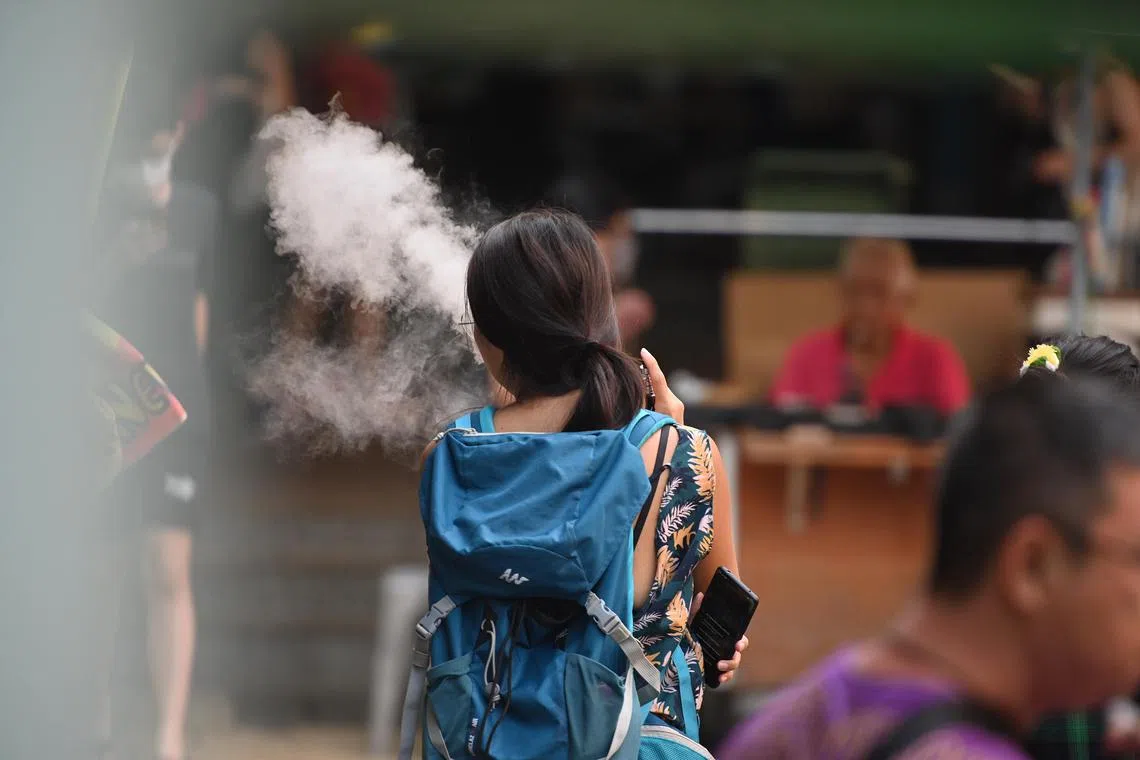Illicit vaping on the rise, more caught in 2022
Sign up now: Get ST's newsletters delivered to your inbox

The latest figures indicate a rise in the vaping trend with almost four times the number of people caught in 2022 than in 2020.
ST PHOTO: DESMOND WEE
SINGAPORE - Last Friday night was just like any other weekend night, with young people packing walkways to get into nightclubs and bars in Clarke Quay.
A persistent sweet aroma in the air, however, was the first whiff that the illegal act of vaping may have caught on with the revellers.
Sure enough, at designated smoking corners, as well as inside clubs, dozens of partygoers could be seen openly inhaling the mist from vaporisers despite it being disallowed on club premises.
The latest figures from the Health Sciences Authority (HSA) indicate a rise in the vaping trend with almost four times the number of people caught in 2022 than in 2020 for using and possessing e-cigarettes.
In 2022, 4,916 people were caught for the offence, which comes with a fine not exceeding $2,000, compared with 1,266 in 2020, and 4,697 in 2021.
A smoking and vaping survey by Milieu in September 2022 also showed illicit vaping to be on the rise in Singapore, with 4.3 per cent of adults using alternative products like vapes. This was a 10 per cent increase from 3.9 per cent in September 2021, and a 43 per cent increase from 3 per cent in the first quarter of 2021.
Vaporisers or e-cigarettes consist of an atomiser, a battery source and a small container for e-liquid or juice. The liquid, which may contain nicotine and chemicals like glycerine and propylene glycol, is heated to form an aerosol that is eventually inhaled. The e-juice comes in flavours such as watermelon, mango, green tea and even buttermilk pudding.
In October 2021, the Ministry of Education said the number of students – from primary school, secondary school and pre-university institutions – caught for smoking and vaping offences has “remained low” at an average of about seven for every 1,000 students over the past three years.
One teacher on a primary school’s disciplinary committee in the north-west of Singapore said that when a pupil is caught vaping, he is counselled about its dangers and his parents are alerted. A repeat offender may face caning.
The teacher, who did not want to be named, told The Straits Times last Wednesday: “They (primary school pupils) told me they took the vaporisers belonging to their parents or brothers who smoke and vape. I have students who said they bought their vapes from secondary school students. I have also counselled a female pupil who was a vape dealer.”
Pupils caught vaping are often using them in the school toilets. “We have helpful janitors, as well as other students, who tell us of students who boast about bringing vaporisers to school,” said the teacher, who added her school has instituted random checks on students’ bags.
The ban on vaporisers took effect on Feb 1, 2018. Yet, its popularity in Singapore steadily rose during Covid-19 movement restrictions in 2020 despite a worldwide drop in cigarette consumption.
In 2019, the revenue collected from duty-paid cigarettes was $1.176 billion while in 2021, the figure was $1.347 billion. A total of 2.9 million packets of duty-unpaid cigarettes were seized by Singapore Customs in 2019, compared with 1.95 million packets seized in 2021.
Vaporisers are bought and sold over the Internet,
In comparison, a packet of 20 premium cigarettes now costs about $14.30.
There are at least 20 groups specialising in vaporisers on messaging app Telegram, with each having about 50,000 vaporiser advertisements and an average of 13,000 members.
Websites with Malaysian contact numbers sell vape packages in Singapore dollars, starting at $30 for a disposable vaporiser. A few sites also peddle cannabis-infused gummy bears, cannabis joint wrappers and cannabis oil.
When the Malaysian border opened in April 2022, some vapers like “Mike”, not his real name, said it was a habit to smuggle small quantities of e-vaporisers and e-juice in his car.
“You get to choose many different styles of vapes and e-juice in Malaysia, and it is only a third of the price compared with vapes sold online in Singapore,” said Mike, 25.
A spokesman for HSA told ST on Saturday that the authority carries out surveillance of retail sites, social media platforms and messaging apps for any suspected peddling of vaporisers and their refill liquids and cartridges. It also collaborates with online platforms like Instagram, Facebook and Carousell to remove illegal postings on tobacco-related products.
In 2022, more than 2,601 postings were removed. From 2018 to 2022, 860 people were caught selling and smuggling vaporisers, and 145 were prosecuted in the same period.
Under the law, any person convicted of selling, offering for sale, possessing for sale, importing or distributing vaporisers is liable to a fine not exceeding $10,000 or to imprisonment for up to six months or both.
The Central Narcotics Bureau (CNB) told ST on Saturday that it also carries out active online surveillance and engages e-commerce companies, courier companies and related industries closely to ensure that their platforms and listings are not misused for drug offences.
A CNB spokesman said some vaporisers may be marketed as “health products” but contain derivatives of hemp or cannabis, which are controlled substances.



